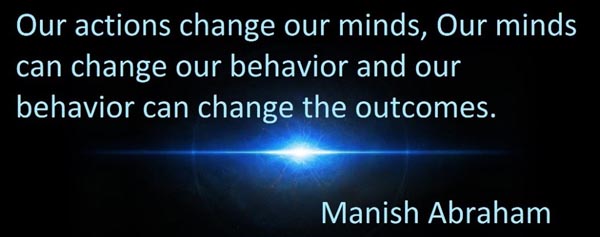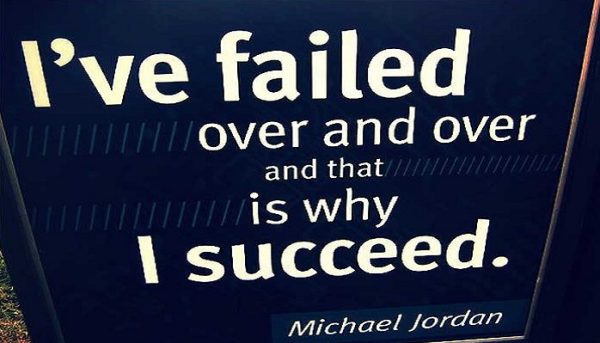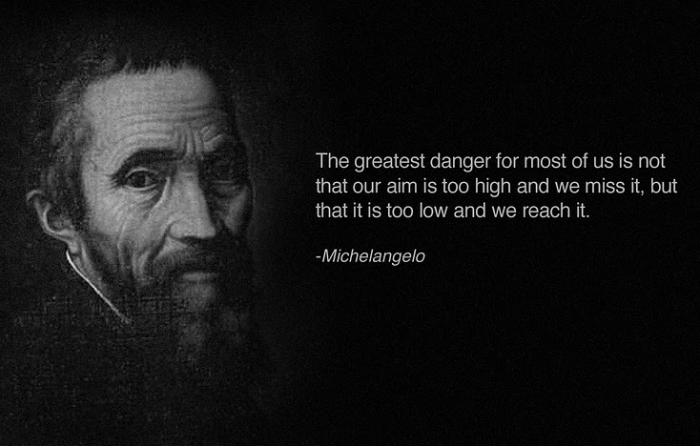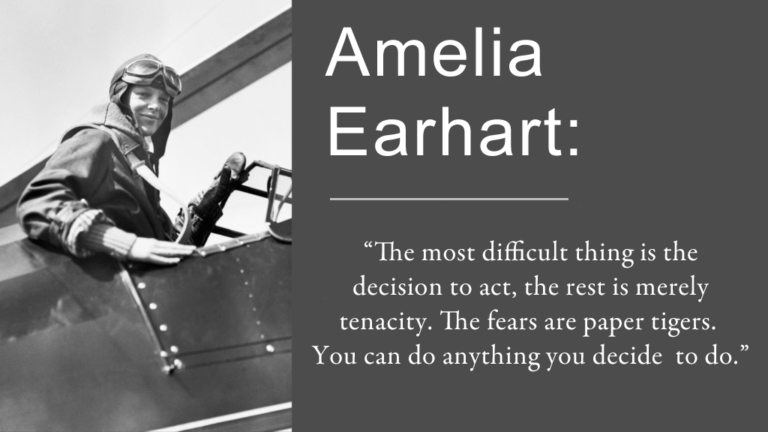
There is one thing that separates the genius from the intellectual… It’s action. Action doesn’t depend upon smarts, genealogy, class, race, gender, financial status, environment, or opportunity. It’s the catalyst for where you’ll go and who you’ll become.
One of the best tools a genius Disruptor can acquire is the ability to take immediate action. A big reason people don’t fully access their intuitive thinking is that they tend to keep everything in their head, intellectualizing, reasoning, and analyzing, while few put anything into action. One of our least-developed muscles is our ability to take immediate action without hesitation.

Action is closely tied to vision. Someone who is a masterful visionary doesn’t just wish, think, or hope, they don’t contemplate, hesitate, or rationalize, they take immediate steps to make their ideas a reality.
The opposite of action is not fear, it’s lack of failure. You actually want failure because, without it, there is no trial and error, no clues to course-correct you, and nothing to help you figure out and learn the best methods for how to connect unlikely dots.
Failure are the markers one encounters along the road to success that help to navigate to the best actions along the way. But without taking action as a starting point, there is ultimately nowhere to go.

Unlike the idea of creating an “action plan” and then building the right moment to execute, taking immediate action diminishes fear, anxiety, and self-criticism. More people associate this with being impulsive, yet this is actually where intuition can become a most powerful ally.
By acting immediately, not letting fear inhibit your actions, you diminish fear and arrive at those failures early. This is the best way to successfully traverse through or navigate around failure even faster because now your learning curve is accelerated.
One of the most powerful ways to build a strong foundation for your intuitive thinking is to act on your first thought. When you’re vacillating between two ideas, intuitively you already know which is the right one. This has been referred to as your “gut instinct.” The problem is that when you get trapped between your rational belief system and your intuitive mindset, you can often hesitate and second-guess your best ideas.
Acting on your first impulse takes practice. If you’ve ever said to yourself: “I should have…” then you know what I’m talking about. Any time “I should have” comes to the forefront of your mind, you already know you don’t fully trust your intuitive thinking.

We’re prone to stifle our choices through ego and judgment of ourselves. We get held up by uncertainty because we contemplate the possibility of failure, inhibiting our capacity to take risks. Too much contemplation can lead one to hesitation, thereby creating a sense of overwhelm which can leave one stuck. However, by developing a habit of taking immediate action, overwhelm has no time to “mess with your head.”
Additionally, when money becomes part of the equation, it can actually be a detriment to action. We all know that when funds get scarce, people tend to second-guess themselves and limit their ability to act, which can create a loss of energy and enthusiasm. Passion, excitement, and curiosity, on the other hand, are great catalysts for taking immediate action, they don’t necessarily rely on money as a motivator, and should be encouraged whenever possible.
Here are some guidelines for taking immediate action:
- “Act. Don’t react.” ~ Bruce Lee – His best gift (and his secret weapon), was not to wait until his opponent struck first, but instead to be the one who set the course for the outcome he desired.
- Act on your first thought—Trust your intuition – Your inner voice will always speak first. You must learn to listen to and trust what it is offering you.
- Train yourself to do things slightly faster than you’re used to – This helps to build stronger intuitive muscles, and as you get better at this, your intuition becomes sharper and more acute.
Emotional Thinking
Emotional thinking can both work for us and against us, yet both aspects (positive and negative) come from within. Our actions and decisions are driven by either positive emotions (i.e., excitement, passion, happiness, joy), or influenced by negative emotions (i.e., disappointment, sadness, anger, frustration, anxiety).
The word emotion dates to 1579 when it was adapted from the French word émouvoir, which means “to stir up.” Emotion ignites action. If we feel passionate and purposeful enough, we get energetically charged, and that heightened enthusiasm drives our actions. That powerful feeling can be the catalyst that directs our decisions and choices to keep moving forward at an accelerated rate. If encouraged and fostered regularly, the thrill of a new idea can both excite and move us forward.
One should not discourage emotion when it comes to action. In a positive state of heightened emotional thinking, we’re willing to take greater risks because we see possibility. Yet when emotions are negatively charged, we can become reactive in our thinking, choices, and motivation. Negative reactions can cause one to close down both physically and emotionally, narrowing their ability to keep moving forward, thereby building a wall of stress and anxiety.
Instead, think about how young children think and behave. Somewhere between newborn and eight years of age, before their natural intuitive mind has been replaced by a rational mindset, children haven’t yet been influenced by outside conditioning, limiting thinking, or reactive behavior. They still do things proactively versus reactively. In this proactive state, they act upon their feelings, playfulness, creativity, excitement, and desires. This is what drives their actions and choices.
They’re often viewed as impulsive in their decisions, and because they act spontaneously, they have no time to react to the noises of fear, doubt, or worry. They haven’t yet been overly affected by outside influencers, attempting to condition or limit their thinking.
Learn to Follow the One-Second Rule: This one is simple: Take immediate action. To cultivate your intuitive thinking, act on your first thought. When you vacillate between your rational and intuitive mindset, it can cause hesitation and create doubt. The reason for this is that the rational mind is intellectually looking for a successful outcome, and if it can’t immediately see one, it will begin to rationalize all the reasons why you should not proceed to move forward.

The best thing you can do to build a super-strong action mindset is to remember that, in the beginning, you should not worry about getting everything right. And because this thinking might be a new muscle for you, allow yourself the freedom (and permission) to experience a learning curve, initially. As you begin to trust your intuition, your actions will get faster, and you’ll gain greater confidence in all your decisions.
Why is This Important?
Our beliefs teach us to do what the “norm” tells us—which fights against our intuitive thinking—and therefore we hesitate, second guess, and stall our natural progress. Genius stems from the willingness to be wrong. It shouldn’t stop you from shifting your strategy. The faster you act, the more you reinforce your ability to not second-guess or doubt yourself.
What if You Don’t Do This?
You can remain stuck and always second-guess your choices. If you remain in this state, you’ll build an unwanted habit of looking outward for comparison, which creates a limiting system for self-doubt. And in this way, you increase the possibility for fear to grow and flourish.
What if You Learn to Take Action?
Mastery is about repetition, which builds experience. The more you do something over and over again, the more you build that powerful muscle memory. As you learn to take more and more immediate actions, your outcomes become richer and more fulfilling. You shorten the thinking process because you’re extrapolating and piecing together information at a faster rate. You’re now entering Sherlock Holmes territory. Action is the best way to develop faster observational techniques, a sharper ability to connect unlikely dots, and the ability to foster a strong conviction in your choices.
This is the mindset of a proactive person. And the more proactive you are, the quicker you will foster and build your ability to design your future. By acting immediately, you become vastly more comfortable with designing how your life should go. As a bonus, you will become less tolerant of things that cause you to react instead of act.
EXERCISE:
For the next five days whenever you encounter hesitation or reflection, choose the first thing that comes to mind. Go with your first decision. Don’t judge or beat yourself up if it doesn’t yield the desired results you were hoping for at first. It takes time and practice to comfortably act upon your first thought and take the actions necessary to create your desired outcome, but very soon it will become second nature. Don’t look to others to see what they do. Stay focused on your decisions and take immediate action in order to cultivate a stronger intuitive mind and a sharper, faster level of divergent thinking.